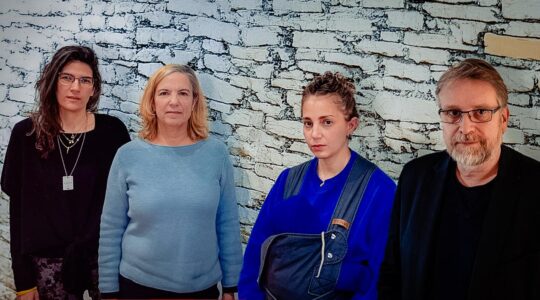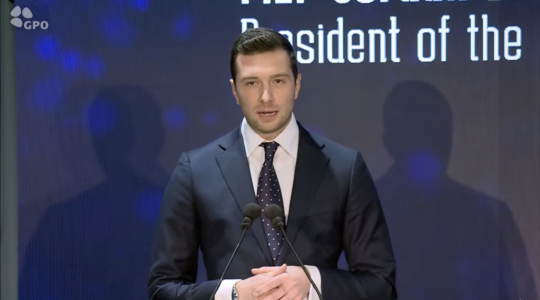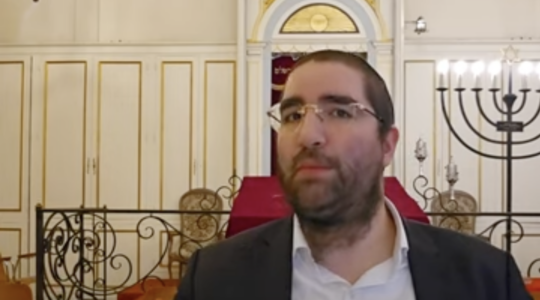NEWS ANALYSIS
GENEVA (JTA) — It’s no secret who was behind the effort to discredit the 2009 Durban Review Conference in Geneva.
For nearly a year before the anti-racism confab, Jewish and pro-Israel groups lobbied hard to get Western countries to boycott the gathering, which they said was certain to treat Israel unfairly, just as the first Durban conference had done in 2001.
Indeed, during the months leading up to the conference, the U.N. high commissioner for human rights, Navi Pillay, noted several times that an orchestrated campaign was behind Western threats to boycott the conference, dubbed Durban II.
“The conference process has been the subject of ferocious and often distorted criticism by certain lobby groups focused on single issues,” she said on Sept. 8, 2008.
Yet Pillay — and many others — refused to name the forces behind the campaign.
“If you Google ‘Durban and racism,’ you see who’s behind 90 percent of the efforts,” Jan Lonn, Swedish coordinator of the Civil Society Forum, said here last week. “It’s not a secret, and everybody knows.”
Asked by JTA if he was referring to Jewish groups and pro-Israel commentators, Lonn replied, “You know this very well, as your media has been frequently reporting on criticism.”
It was an ironic twist to the common storyline of anti-Semites naming Jews as the perpetrators of shadowy worldwide conspiracies. Those conspiracies typically are as true as the “The Protocols of the Elders of Zion” — that is, to say, not at all.
This time, however, the Jews actually did conspire, albeit openly, to sabotage the conference.
The World Jewish Congress met with officials from 17 U.N. member states to push for a boycott. Hudson Institute scholar Anne Bayefsky banged the anti-Durban drum for months in the U.S. media, including the National Review, the New York Daily News and Forbes. And Israeli officials pressed their allies that intended to participate in the conference not to tolerate any anti-Israel resolutions.
But for the most part, Durban II’s organizers and participants did not want to point the finger at the Jews for the anti-Durban effort for fear of being labeled anti-Semites.
“I can’t tell you exactly who the lobby is,” Pillay said in a March 12 interview with Australia’s ABC.net. “I can just pick out that it seems to be one source putting out this wrong information and labeling this review conference as ‘hate fest.’ ”
Use of the loaded term “lobby,” however, appeared to be too much for some Jewish groups.
UN Watch, a monitoring organization, sent Pillay a letter asking her “to avoid using certain well-known stereotypes.” Hillel Neuer, executive director of UN Watch, said the term “fostered images of a mysterious, unnamed, powerful” lobby.
“Some media asked me about ‘single-issue lobby groups’ — a term no one would ever use for nongovernmental advocacy groups that protest unfair treatment of blacks, gays, women, Muslims, etc.,” Neuer said.
Pillay’s spokesman, Rupert Colville, told JTA her office “has no objection to lobbying per se. Lobbying is the life blood of the human rights movement and a key component of democracy. What we object to is blatantly dishonest lobbying.”
Colville added, “We have never characterized the dishonest methods used to try to sink the Durban Review Conference as being exclusively employed by one particular country or one racially defined group.”
Others were a little more forthcoming about who they believed was responsible for the anti-Durban II campaign.
A staffer from a major nongovernmental organization said there was just one reason why a European country like Germany would help draft the conference’s resolution on the Friday before the conference, only to decide to boycott it that very weekend.
“The Jewish lobby,” said the staffer, who refused to be identified by name or organization.
“What I’m afraid of is if you put that in my mouth, it will sound like a conspiracy theory, and then readers will say we’re anti-Semitic,” said the staffer.
Malaak Shabazz, the daughter of black rights activist Malcolm X, had no such qualms. She blamed “Zionist agitators” for being disruptive and aggressive toward her in Geneva, and she filed a letter of protest with Pillay’s office.
“People confuse Zionism with Judaism, and that’s completely unfortunate,” she said.
“The Zionists here are making people hate Jews,” Shabazz said. “I was unfamiliar with the tactics of Zionists. But I got a crash course on it here.”
JTA has documented Jewish history in real-time for over a century. Keep our journalism strong by joining us in supporting independent, award-winning reporting.





